Feed aggregator
The Teller of Small Fortunes - Book Review
 The Teller of Small Fortunesby Julie Leong
The Teller of Small Fortunesby Julie LeongWhat is it about:Tao is an immigrant fortune teller, traveling between villages with just her trusty mule for company. She only tells "small" fortunes: whether it will hail next week; which boy the barmaid will kiss; when the cow will calve. She knows from bitter experience that big fortunes come with big consequences…
Even if it’s a lonely life, it’s better than the one she left behind. But a small fortune unexpectedly becomes something more when a (semi) reformed thief and an ex-mercenary recruit her into their desperate search for a lost child. Soon, they’re joined by a baker with a knead for adventure, and—of course—a slightly magical cat.
Tao sets down a new path with companions as big-hearted as her fortunes are small. But as she lowers her walls, the shadows of her past are closing in—and she’ll have to decide whether to risk everything to preserve the family she never thought she could have.
What did I think of it:This is such a good read!
I will confess I fell in love with the cover, and that's why I bought tis book. It turned out to be a Cozy Fantasy: as if your read is giving you a hug by being mostly nice, comforting, and happy.
I loved Tao and the people she meets and befriends. Especially Mash, the ex-mercenary is so awesome (and bearded mostly, although he should stop shaving entirely Voodoo Bride wants me to add).
There are of course some stakes to keep everyone moving, but I never worried, trusting that this book wouldn't disappoint me by suddenly being mean to me.
All in all a wonderful read, and I immediately bought an extra copy to gift a good friend for her birthday (because nobody gets to borrow mine!).
Why should you read it:Cozy Fantasy! So nice and huggable!
Goth Chick News: The Hairy Problem of Werewolf Movies
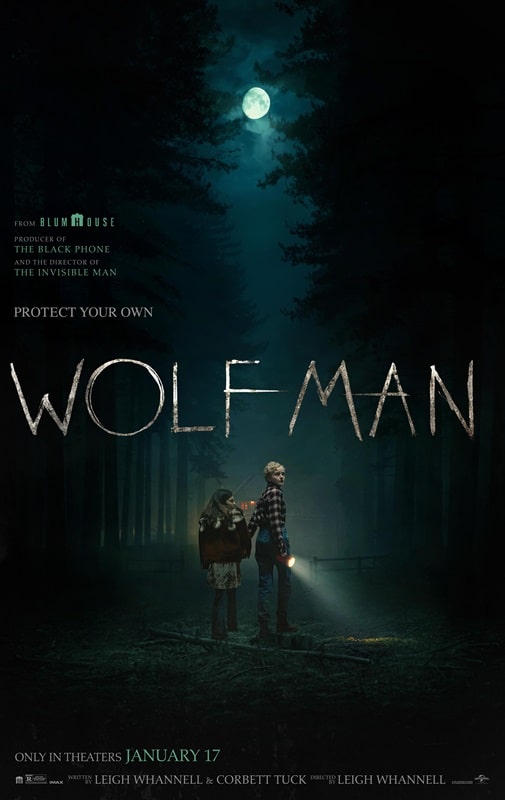 Wolf Man (Universal Pictures, January 17, 2025)
Wolf Man (Universal Pictures, January 17, 2025)
Why oh why can’t Hollywood produce a decent werewolf movie?
I’ve had my heart broken twice in the past few months, first by The Beast Within (2024) and most recently by Wolf Man (2025).
I first told you about The Beast Within starring Kit Harington, back in August. In summary, it was lousy. Though the trailer implied a suspenseful, cohesive tale, Beast was a rambling affair that didn’t seem to know what it wanted to be. As for an actual werewolf transformation, it was implied but never really materialized. Instead, director Alexander J. Farrell tried to distract us from this fact with a knee-jerking series of events that barely held together as a story. Even putting Harington half-naked in a dog collar wasn’t enough to make me forgive this mess.
So, if you tell me I should have known better when, with renewed hope, I ran off to the theater last weekend to see Wolf Man, I wouldn’t argue.
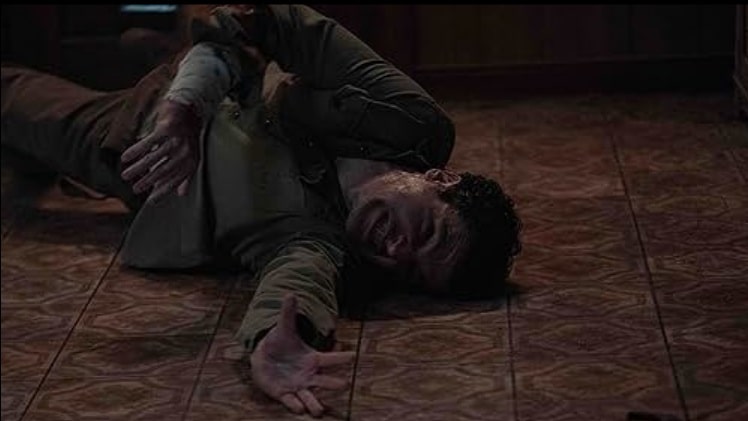 Wolf Man
Wolf Man
Making another attempt at revitalizing the classic monsters franchise ahead of opening its “Dark Universe” park in May, Universal Studios got behind this werewolf movie produced by Blumhouse, which made me think there was a chance it would be good. Afterall, it was Jason Blum who inspired Universal to give their Dark Universe movie franchise another go after Tom Cruise’s The Mummy was an unmitigated atrocity.
Universal had scrapped all the big-budget monster remakes they had teed up, which was more than fine with most fans, including me. Then here comes indie production company Blumhouse, hitting a home run with The Invisible Man (2020). Making nearly $145M on a $7M budget that’s a 20x return, meaning Hollywood couldn’t throw new projects at Jason Blum fast enough. When I heard Blumhouse had been handed the remake of Wolf Man (1941) I dared to be cautiously optimistic.
What a mistake.
I can count on one hand the number of times I’ve sat in a theater looking at my watch. I nearly always find something to love about most movies, but Wolf Man was so awful I would have got up and left had it not been for the tiny flame of hope I had that maybe the ending would redeem my two-hour investment.
It didn’t.
Here’s how Universal described Wolf Man:
Golden Globe nominee Christopher Abbott (Poor Things, It Comes at Night) stars as Blake, a San Francisco husband and father, who inherits his remote childhood home in rural Oregon after his own father vanishes and is presumed dead. With his marriage to his high-powered wife, Charlotte (Emmy winner Julia Garner; Ozark, Inventing Anna), fraying, Blake persuades Charlotte to take a break from the city and visit the property with their young daughter, Ginger.
But as the family approaches the farmhouse in the dead of night, they’re attacked by an unseen animal and, in a desperate escape, barricade themselves inside the home as the creature prowls the perimeter. As the night stretches on, however, Blake begins to behave strangely, transforming into something unrecognizable, and Charlotte will be forced to decide whether the terror within their house is more lethal than the danger without.
Sounds promising right? And for the first 20 minutes or so it kind of was. The dialog was lame, but the premise was interesting. En route to the childhood home in the middle of nowhere, the family gets into an accident and as they extricate themselves from the wreckage, the dad is bitten by an animal that runs off before they get a good look. Que the slow transformation of the dad into a werewolf which could have been awesome but instead was so drawn out and mind-numbingly boring it made me angry.
And come on – we had two fabulous werewolf movies back in the 80s in the form of The Howling (1981) and American Werewolf in London (1981), so someone in Hollywood must have kept the instructions on how to create a credible werewolf transformation with practical effects.
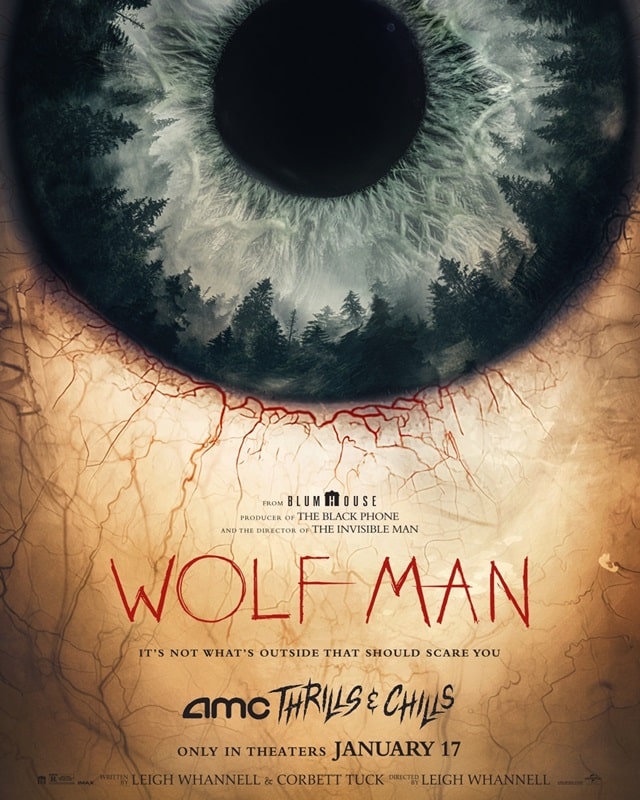 Wolf Man
Wolf Man
But no. Wolf Man not only failed in its plot and dialog, but it utterly and completely defecated the mattress in creating an even remotely interesting werewolf.
So why does Hollywood keep getting werewolves wrong? The answer might lie in their complexity. Werewolves require nuance, and filmmakers seem allergic to it. Moreover, there are considerable technical challenges of depicting a werewolf convincingly. While CGI can be incredible, the extreme overuse of computer effects has resulted in a bit of audience backlash, causing filmmakers to go back to practical effects which clearly can’t keep pace with a modern audience’s expectations.
Finally, there’s a lack of fresh ideas. Perhaps it’s time for filmmakers to take inspiration from outside the box—or at least hire a scriptwriter who doesn’t think “lycanthropy” is just a fancy word for mood swings.
Despite these missteps, there’s still a tiny glimmer of hope for us werewolf fans. Enter Robert Eggers, the visionary director behind Nosferatu (which I’ve seen multiple times and absolutely loved – more on that next week). Eggers has announced his next project, Werwulf, will be a period horror film that promises to blend folklore, psychological terror, and meticulously crafted visuals into the ultimate werewolf tale.
Fans of Eggers know his penchant for historical authenticity and atmospheric storytelling, which could make Werwulf the fresh take that the genre desperately needs. With Eggers at the helm, there’s genuine hope that audiences will finally get a werewolf film that balances primal horror with emotional depth.
Hollywood, the ball’s in your court. But for now, maybe leave the werewolves alone for a bit. They deserve a better cinematic fate than what they’ve had recently.
The Sword and Planet of Edgar Rice Burroughs, Part I
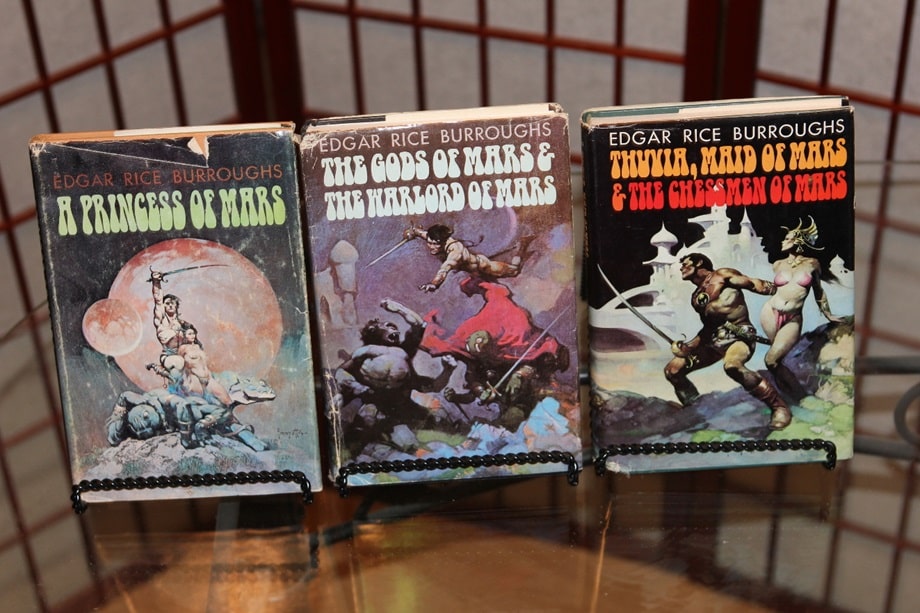 Edgar Rice Burroughs’ Barsoom novels: A Princess of Mars, The Gods of Mars and The Warlord of Mars, and Thuvia, Maid of Mars and The Chessmen of Mars (Science Fiction Books Club, July 1970, January 1971, and January 1973). Covers by Frank Frazetta
Edgar Rice Burroughs’ Barsoom novels: A Princess of Mars, The Gods of Mars and The Warlord of Mars, and Thuvia, Maid of Mars and The Chessmen of Mars (Science Fiction Books Club, July 1970, January 1971, and January 1973). Covers by Frank Frazetta
For sheer fun and adventure there’s nothing better in my opinion than Sword & Planet fiction (also called Interplanetary Adventure, Interplanetary Romance, or Planetary Romance). But exactly what is Sword & Planet fiction? Well, Edgar Rice Burroughs (ERB) created the prototype in 1911 with A Princess of Mars, which featured an Earthman named John Carter who is mysteriously transported to Mars, called Barsoom by its inhabitants.
The basic Sword & Planet story involves an earthman (rarely an earthwoman up to this point in time; 2025) on a strange world where he must use his wits, his muscles, and his sword against a host of human and nonhuman foes. The hero is generally chivalrous and the setting is an exotic alien world, often with multiple suns or multiple moons, populated by a variety of strange plants, animals, and intelligent beings. Magic is virtually non-existent, but there may be elements of “super-science,” such as open-decked flying ships or even ray-guns, although the latter take second billing to the blade. The emphasis is on swashbuckling sword fights, wild escapes, and desperate rescues.
[Click the images for Mars-sized versions.]
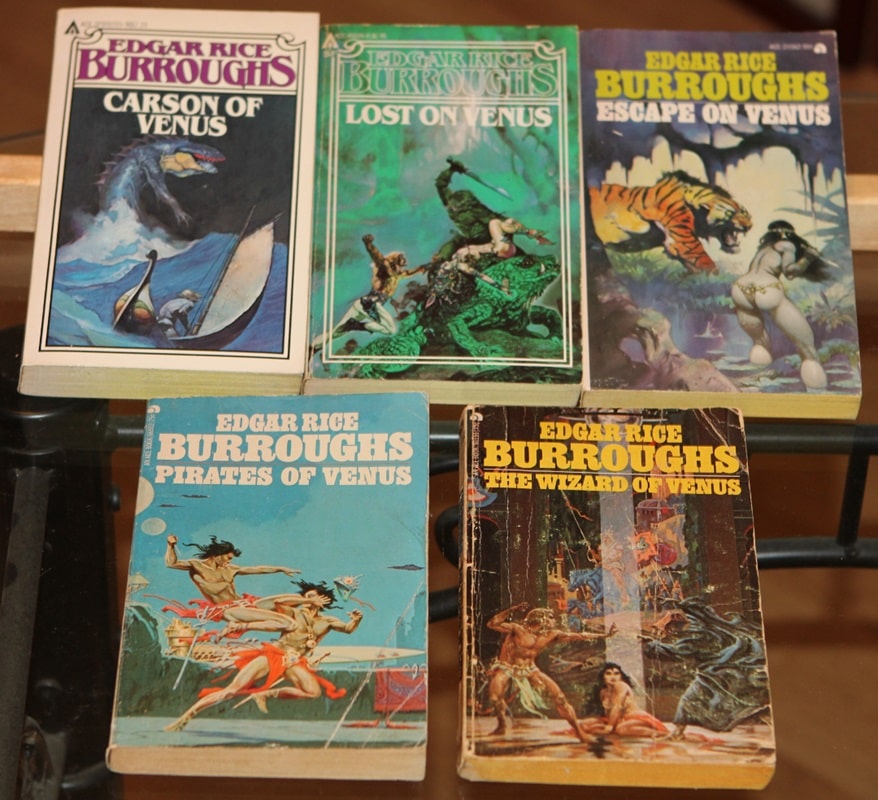 Edgar Rice Burroughs’ Venus novels: Carson of Venus, Lost on Venus, Escape on Venus, Pirates of Venus, and The Wizard of Venus (Ace Books, June 1979, June 1979, January 1974, March 1973, and January 1973). Covers by Frank Frazetta, Esteban Maroto, Frazetta, Roy G. Krenkel, and Roy G. Krenkel
Edgar Rice Burroughs’ Venus novels: Carson of Venus, Lost on Venus, Escape on Venus, Pirates of Venus, and The Wizard of Venus (Ace Books, June 1979, June 1979, January 1974, March 1973, and January 1973). Covers by Frank Frazetta, Esteban Maroto, Frazetta, Roy G. Krenkel, and Roy G. Krenkel
In addition to the Barsoom books, ERB also wrote a second Sword & Planet series, five books set on Venus (Amtor to the natives), featuring the earthman Carson Napier. Napier is intending to fly a rocket ship to Mars but ends up crashing on cloud-covered Venus.
He finds a world of giant trees and strange creatures, and, of course, a princess. Her name is Duare. Like Barsoom, Amtor mixes the primitive with super science, but the emphasis is on action, adventure, and personal combat with edged weapons.
 Escape on Venus, The Moon Men, Pirates of Venus, A Fighting Man of Mars, and The Chessmen of Mars (Ace Books, 1964, October 1962, January 1963, March 1963, and December 1962). Covers by Roy G. Krenkel, Ed Emshwiller, Krenkel, Krenkel, and Krenkel
Escape on Venus, The Moon Men, Pirates of Venus, A Fighting Man of Mars, and The Chessmen of Mars (Ace Books, 1964, October 1962, January 1963, March 1963, and December 1962). Covers by Roy G. Krenkel, Ed Emshwiller, Krenkel, Krenkel, and Krenkel
The five books in the series are:
1. Pirates of Venus
2. Lost on Venus
3. Carson of Venus
4. Escape on Venus
5. The Wizard of Venus
The Wizard of Venus is a novelette that wasn’t published until after ERB’s death. The book includes a second novelette called “Pirate Blood.”
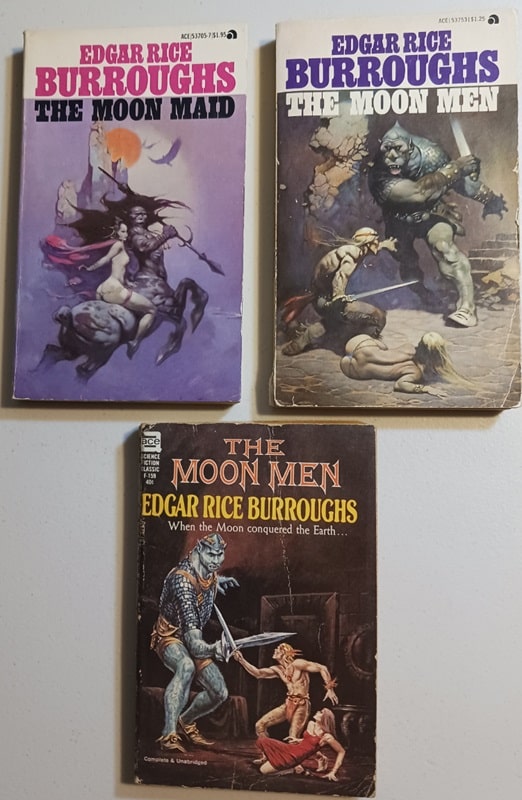 The Moon Maid, The Moon Men, and The Moon Men (Ace Books, January 1974, March 1974, and October 1962). Covers by Frank Frazetta, Frazetta, and Ed Emshwiller
The Moon Maid, The Moon Men, and The Moon Men (Ace Books, January 1974, March 1974, and October 1962). Covers by Frank Frazetta, Frazetta, and Ed Emshwiller
I enjoyed ERB’s Venus books a lot but they were not the equal of his Mars books — in my opinion. A lot of this has to do with Carson Napier. He’s no John Carter. He is a hero, and brave, but he makes plenty of mistakes and often needs to be rescued himself. He also uses more advanced weapons — essentially ray-guns — on many occasions. That means less “swashbuckling,” a minus for me. Certainly, though, if you’re interested in S&P fiction, the Venus books are a must.
The Venus books have been released in various editions. The pictures I have above mix older and newer editions. The older ERB books have covers and illustrations by Roy G. Krenkel, Jr, one of my favorite artists. Some of the newer ones have Frazetta images, and Frazetta was influenced by Krenkel.
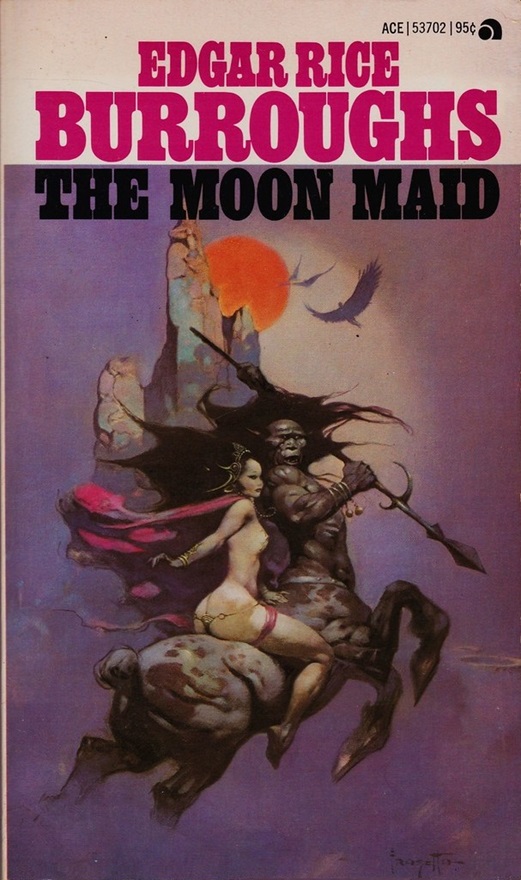 The Moon Maid (Ace Books, January 1974). Cover by Frank Frazetta
The Moon Maid (Ace Books, January 1974). Cover by Frank Frazetta
A series that I would have liked to see more of from ERB was his Moon Maid series. It’s sometimes described as a trilogy, but only the first book is full length. That’s The Moon Maid (copyright 1923). The sequels are novellas called The Moon Men and The Red Hawk (copyright 1925), which I first read combined in a later Ace book called The Moon Men. The novellas are reprinted from the pages of Argosy All-Story Weekly, where the tales were first serialized in 1925.
The Moon Maid has an awesome Frank Frazetta cover that is one of my favorites among his works. I have two copies of The Moon Men, one with a Frazetta cover and the other with a cover by Ed Emsh.
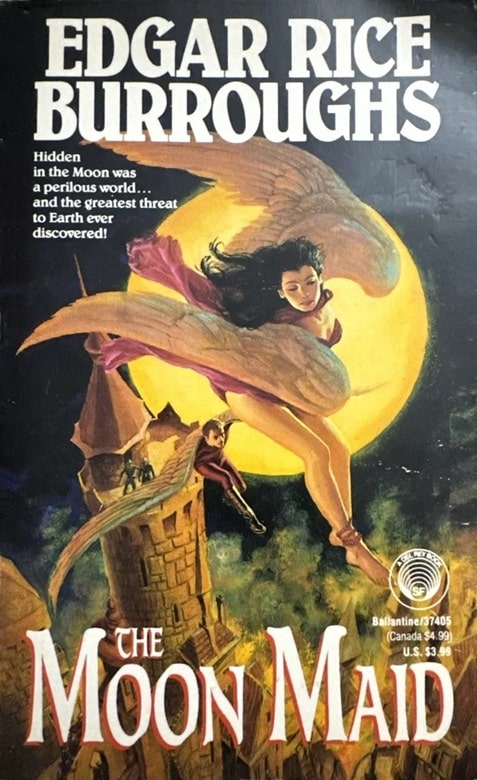
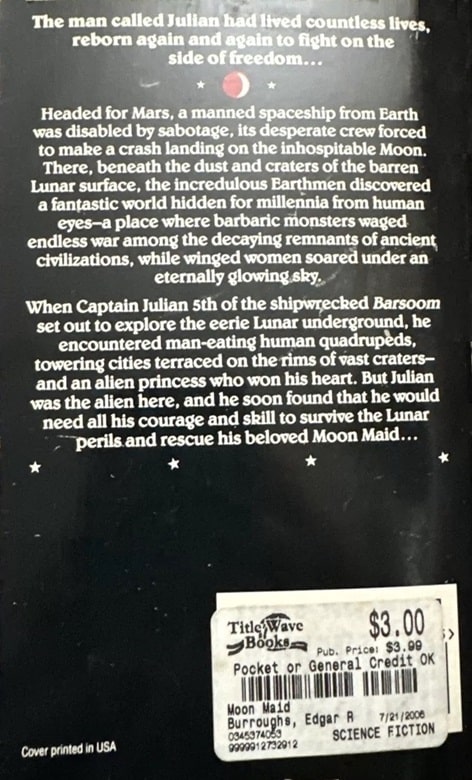
The Moon Maid (Del Rey Books, May 1992). Cover by Laurence Schwinger
The hero in The Moon Maid is Julian the 5th, an Earthman who has lived through many previous incarnations and remembers them. He is leading a rocket ship journey to Mars when the ship has to make a forced landing on the Moon.
They find an oxygen atmosphere inside the moon, and a wild land of strange creatures, including human-type and centaur-type intelligent races. Julian meets a princess of the human-type, Nah-ee-lah, and must rescue her. There’s lots of action and hand to hand combat, although not a lot of sword fighting. I would classify it as S&P.
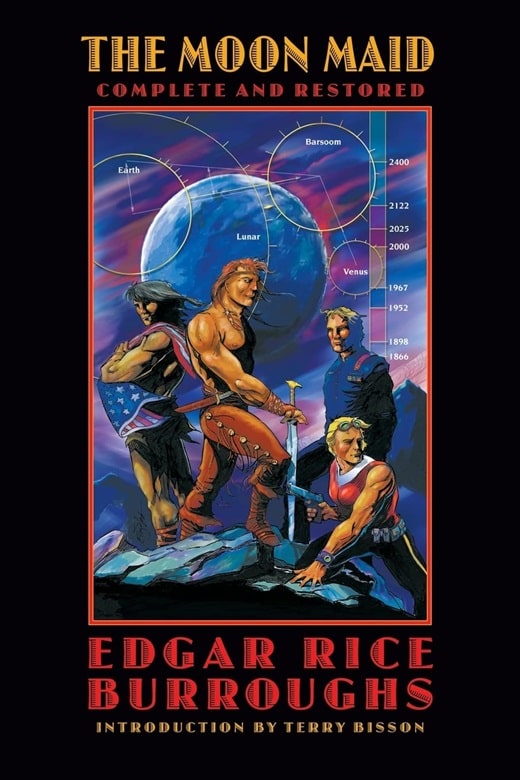
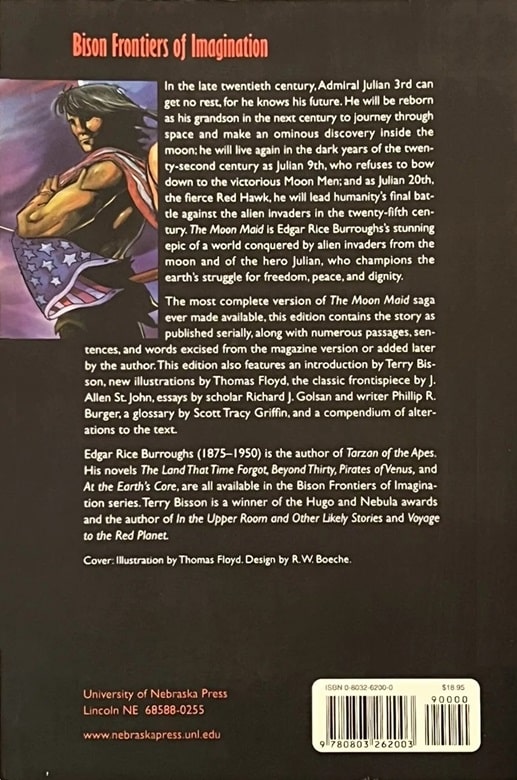
The Moon Maid: Complete and Restored (Bison Books, April 2002). Cover art by Thomas Floyd
The Moon Men and The Red Hawk are not — properly speaking — S&P fiction, because they take place on Earth. In The Moon Men, the Kalkar inhabitants of the Moon have conquered Earth. Julian the 9th, another reincarnation, leads a revolt, but it remains to “Red Hawk,” a descendent of Julian to finally free Earth from the Lunarians’ rule.
The three parts of the Moon trilogy have been published together by Bison books along with all kinds of extras (see above). I don’t have that copy yet but will get it for my collection. The series is one of ERB’s best.
More on Burroughs, including Tarzan and The Land that Time Forgot, in my next post.
Charles Gramlich administers The Swords & Planet League group on Facebook, where this post first appeared. His last article for Black Gate was The Masters of Narrative Drive.
Lividian update: Our first “larger print” edition: LEVIATHAN
Brian Freeman of Lividian Publications posted this news today on his Patreon.
The interior font size for LEVIATHAN was selected to keep the already high retail cost from going higher, but the text turned out smaller than I expected for some reason and I definitely understand it was too small for some readers. None of us are getting any younger! So, here’s what we’re going to do:
The Limited Edition, like the other Matthew Corbett Limited Editions from Lividian, will have a larger interior font size. But those are expensive books and down the road a bit.
In the meantime, Robert McCammon gave the OK for us to rush a “Larger Print” version of the book. This isn’t a traditional Large Print edition, but it uses the same font size as the Limited Edition, which is considerably more readable. See the photo above.
Note: there are significantly more pages in this edition but it contains no new content. That’s just the result of the larger text taking up more space. You’re not missing out on anything new.
This “Larger Print” version is a trade paperback to keep the price reasonable, but there will be a “real” trade paperback published later this year with new Vincent Chong artwork, just like most of the other books in the series, and it will also use this larger font.
You can order this “Larger Print” edition on Amazon now — or if you bought the trade hardcover directly from me and need one, please just send me an email and we’ll work something out: brian@lividian.com
Also, I’m trying to figure out the best way to send this to the Lividian tier supporters. I know in the past some of you haven’t wanted trade paperbacks, and some of you won’t necessarily feel a need to have this particular edition… I’m thinking it might get included in another shipment to save on postage.
More news soon!
Best,
Brian
P.S. Some of you have correctly guessed we have Matthew Corbett news for later this year. First of all, shhhhhhh… Secondly, we’ll be using the standard Limited Edition font size for the text in all editions of that title.
Spotlight on “Victorian Psycho” by Virginia Feito
Victorian Psycho is soon to be a feature film from A24 starring Margaret Qualley and…
The post Spotlight on “Victorian Psycho” by Virginia Feito appeared first on LitStack.
On McPig's Radar - Never the Roses
Did I already read this? Yes!
Am I still totally looking forward to getting this beauty in my eager trotters? YES!
Believe me: you want this book! It's utterly amazing and beautiful in and out!
Go preorder: I totally did.
 Never the Rosesby Jennifer K. Lambert
Never the Rosesby Jennifer K. LambertUNSTOPPABLE WAR. UNSPEAKABLE SINS. IMPOSSIBLE LOVE.
Genevieve Gornichec’s The Witch’s Heart meets Madeline Miller’s Circe in this epic and deeply emotional romantic fantasy debut by Jennifer K. Lambert. The hardcover edition features beautiful stenciled edges.
The Dread Sorceress Oneira has retired. She’s exhausted from fighting the endless wars of kings and queens, and has long accepted that her death is near. Alone at last but for a few uninvited companions―a near-mythical wolf, a goddess’s avatar, and a feline that embodies magic itself―Oneira realizes that she’s bored. On a whim, or perhaps at the behest of fate, she makes an unlikely trip to the most extensive library in existence: the home of her most powerful rival, the sorcerer Stearanos.
By recklessly stealing a book from him, Oneira inadvertently initiates a forbidden correspondence. Taunting notes and clever retorts reveal a connection neither has found―nor could ever find―in any other.
But Oneira soon learns that Stearanos, bound to a vile king, is tasked with waging war on the queen she once served. A relationship with him is far too dangerous to pursue despite their mutual desire―and yet, Oneira can’t seem to stay away.
A bond with Stearanos could alight the long-extinct flame of life within her… or it could destroy her entirely.
Expected publication July 8, 2025
Review: Grave Empire by Richard Swan

Buy Grave Empire OFFICIAL AUTHOR BIO: Richard Swan is a critically acclaimed British genre writer. His debut fantasy novel, The Justice of Kings, was an instant Sunday Times bestseller and has been translated into seven languages. His other work includes the Art of War and Great Silence trilogies, as well as short fiction for Black Library and Grimdark Magazine.
Richard is a qualified lawyer, and before writing full time spent ten years litigating multimillion pound commercial disputes in London. He currently lives in Sydney with his wife and three young sons.
FORMAT/INFO: Grave Empire will release on February 4th, 2025. It will be available in paperback, ebook, and audiobook formats.
OVERVIEW/ANALYSIS: Renata Rainer's job is a joke. As ambassador to the Stygion mermen, she largely has given up hope of ever being useful, given that the mermen want nothing to do with humans. But when two monks arrive claiming to have lost contact with the afterlife, suddenly Renata finds herself in the midst of a critical mission. The Stygion are some of the world's foremost arcana practitioners, and it's up to Renata to verify if recent portents do indeed herald an apocalyptic event known as the Great Silence. But Renata's not the only one interested in the Great Silence - and there are those who want help along the end of the world instead of stopping it.
Grave Empire is a haunting, harrowing journey that envelopes you in its atmosphere, while asking readers for patience in experiencing the actual payoff. This is a story of three individuals scattered across an empire who are realizing that a Very Bad Thing is coming. One is unraveling the secrets of a mysterious plague, another must travel through a warzone to consult with magic practitioners who can shed light on an ancient prophecy, and another is investigating strange reports on the frontier of the empire. Each story is compelling and unsettling, as our characters come to understand just how very wrong things are.
And yet when the dust settled, it felt like all that had been accomplished was learning that yes, a Bad Thing is coming and it is a VERY Bad Thing. The nature of the Great Silence is absolutely a satisfactory threat, and I look forward to seeing how our characters try to handle it, especially as some dominoes began tipping at the end of our story. But this first book is essentially all table setting. Here is the empire, here are the characters, here is the state of the mortal plane, here are some of the weird things that are happening. Will we explain how these weird things are tied together? Not really.
I do want to touch on the relationship between the Empire of the Wolf trilogy and this new The Great Silence trilogy. You do not need to have read the first trilogy to enjoy this new series; the events of Empire of the Wolf are as removed from the characters as the Napoleonic Wars are for us. Those events were definitely a big thing that happened, but they don't inform the characters' day to day lives.
The writing here is also more accessible than the previous trilogy. The first series was told first-person memoir style, while this new one is told across three third-person POVs. I think it also reflects the difference in tone between the two stories. Whereas Empire of the Wolf was a more personal journey of an individual caught up in world-shaking events, Grave Empire feels a little more big picture, a view of how several nations will grapple with a new threat.
CONCLUSION: I want to be clear, overall I really enjoyed Grave Empire, even if the ending left me a bit underwhelmed. I remain hopeful that the second book in this trilogy is going to take everything in the first book and use it for a fantastic sequel. In reading the first trilogy set in this world, I was lukewarm on book one, and then the sequel was one of my top reads the following year. Given how monumentally unsettling the nature of the Great Silence is, I think there's every chance this series will follow in its predecessor's footsteps.
Lowering the Hammer Snippet 2
Sitrep: So, Rea got the manuscript back to me early. So, I went through the usual stuff and shot it off to Goodlife. Shelley just said that they'd have it back to me by the weekend or in a week.
So, snippet 2:
Normal 0 false false false EN-US X-NONE X-NONE MicrosoftInternetExplorer4 /* Style Definitions */ table.MsoNormalTable {mso-style-name:"Table Normal"; mso-tstyle-rowband-size:0; mso-tstyle-colband-size:0; mso-style-noshow:yes; mso-style-priority:99; mso-style-qformat:yes; mso-style-parent:""; mso-padding-alt:0in 5.4pt 0in 5.4pt; mso-para-margin:0in; mso-para-margin-bottom:.0001pt; mso-pagination:widow-orphan; font-size:10.0pt; font-family:"Times New Roman","serif";}
Chapter 2
Atlas XIV
“So, where are we on things?” Catherine asked once the Admiralty had assembled. Among the senior leadership was her lover, Rear Admiral Elvira Varbossa. The assembled officers came to attention politely as protocol dictated.
Catherine glanced at the seat to the right of her that Captain Su was standing in front of. He wasn’t bad but she keenly missed Countess Newberry from time to time, specifically this time.
“We have the latest intel dump in, ma’am. It isn’t good,” the captain stated.
“Oh?” Catherine said as she took her seat at the head of the table. The standing officers took their seats quickly.
Going around the table were Vice Admiral Aden McRaven of Operations; Captain Sherman Su. head of ONI and Imperial Intelligence; Vice Admiral Hyman Preece, head of BuShips; Vice Admiral Latisha Nuert, head of BuPers; Vice Admiral Hsong Chen, head of Logistics; Vice Admiral Jennifer Post, head of Schools; Captain Lorna Justice, head of Medicine, and then Elvira as head of special engineering operations aka the battle moon itself.
Many of the officers around the table held double positions in the civilian cabinet.
Everyone felt the pressure of their position. But the cutthroat attitude was missing. Catherine was known to be ruthless but she had put an emphasis on quality and on civility. She was pushing professionalism and turning over a new leaf. After over a decade as Empress, she was starting to make some headway.
Well, I had been making progress until the damn Fed spy had gotten on board and broadcast our location to the galaxy and wrecked a lot of stuff, she thought sourly. May you rot in hell you son of a …. she cut the errant thought off.
“We have the latest news intercepts. The war in Tau sector has more or less ended several months ago,” Captain Su reported.
“Which?” Admiral Chen asked.
“Excuse me, sir?”
“Is it more or less?” Admiral Chen asked.
“Ended as in they are in a truce and have been undergoing extended peace treaty talks,” Captain Su explained.
“Oh.”
Catherine grimaced. She had read the précis and wasn’t happy with the news.
“There has been a catastrophic change in leadership with the Taurens after the battle of New Tau Metropolis. Once their fleet was run down and destroyed, their government fell and a new one was elected to replace them. They sued for peace.”
“Darn,” Catherine said mildly. The distraction was one reason they’d been able to continue to operate. Clearly, that was coming to an end. That meant the Federation would be returning its attention to them soon enough.
Not good, she reminded herself.
“The Secretary of State Moira Sema is traveling to the sector now to finalize the peace treaty,” Captain Su reported.
“How did the Federation win?” Admiral Preece asked. “I thought they were in trouble given the distance and weight of metal against them?”
“Well, they managed to fight a rearguard action to delay the enemy, primarily around their carrier forces. The Taurens left themselves vulnerable to fighter and bomber strikes repeatedly. That delay allowed the Feds to get their wormhole open,” Captain Su explained. He used his implants to control the view screen nearby to show a series of still images and even a short video clip. “They sent two fleets over which took the Taurens with Fifth Fleet.”
“Oh,” Admiral Preece said. He looked thoughtful.
Looks were exchanged around the table.
“That leads to the second bit of really bad news,” Captain Su stated. The room grew tense. “The Federation has activated the gate here in this sector. They now have a straight shot from Rho to here.”
“Two fleets,” Catherine murmured. All eyes turned to her slowly. The admirals were not happy about the last news. Her eyes flicked back and forth. She’d read it but it hadn’t sunken in until that moment that the Federation was continuing to expand and grow. Meanwhile, her people were struggling to make good on what they had.
It just drove the point home that they were pirates. They had no business standing toe to toe with the Federation anymore.
“We need to accelerate the repairs and get the hell out of here,” Admiral Chen said firmly. That earned a few nods around the table.
“I’d love to but we are still making good on the repairs from the recent sabotage,” Catherine said with a nod to Elvira.
All eyes shifted to the raven haired admiral. “Yes, well, we have made good on most of the physical damage. But we do have some issues there. The software is still an ongoing trial to sort out and fix. The spy was fiendishly clever in putting viruses everywhere,” Elvira reported.
A few people grimaced.
“Stop making excuses. Can you get us out of here or not?” Admiral Post asked testily. It was a sign of the stress that she was under that he spoke to the Empress’ lover in public.
“I’m not making excuses, I am explaining the situation,” Elvira said before anyone said or did anything. Her eyes cut to Catherine briefly to quell Catherine stepping in. She could and would fight her own battles.
“At the moment, our risk assessment puts us at a 20 percent chance of success if we jump now.”
“Twenty?” Admiral Post asked. She didn’t look like that she liked that number at all.
Elvira nodded grimly and pulled the latest sim up on the main screen. “That is correct. The sabotage also slowed our forward progress. We are now getting back on track there.”
“Can we accelerate it if we raid for parts? The Feds make good stuff I believe,” Admiral Chen stated.
There were hopeful and even a few mischievous expressions around the table at that idea.
“That is very true, but …,” Elvira looked to the captain.
“The risks aren’t worth the exposure I’m afraid,” the captain said with a shake of his head.
“Without risk there is no reward,” Admiral Chen said doggedly.
“You’d think that, but in doing the risk assessment, we noted a few things. First, the components we need are no longer easily accessible here. The only two places we can source them are in the gate system and in the system capital. Both of which are heavily guarded by Second Fleet task forces.”
“And potentially another fleet by now,” Aden said quietly.
“Another problem is their built-in security and safeguards. Any hardware we catch will come with those problems that could set us back even further,” Admiral Preece warned.
A few people winced.
“Correct. We have become aware of some logistic nodes, but they are no doubt honey traps arranged for us to send a raiding force to,” the captain stated.
A few more people winced.
“I’d rather not lead them back here or have another raid go bad,” Admiral Post said dryly.
More than one person around the table winced again. Rear Admiral Paul Race, the former second-in-command of operations, had led a raiding force to take on a convoy of grav emitters destined for the gate system several years prior. Somewhere along the way, his task force had been spotted and ambushed. The Federation had done an excellent job turning the tables on the raiders.
A few ships had made it back; the admiral’s flagship had not been among them.
Catherine missed him for a brief moment. He had been a good fleet commander, solid and dependable. Pity he’d walked into a trap and gotten his fleet torn apart. She missed those crews and ships too.
“So, those are out obviously,” Admiral Chen said sourly.
“Correct. The only other known source is the factories which are located in Rho and thus out of our reach,” the captain stated.
“Damn,” Admiral Chen muttered.
The captain nodded. “My sentiments exactly.”
“There has been a recent uptick in scouting along the western flank. It is … concerning,” the captain stated with an eye to the head of operations.
Admiral McRaven nodded grimly.
“Can we wake some of the sleepers? See if they could help? I don’t know, isolate them like before?” Admiral Post asked. She looked over to Latisha and then back to the captain.
Catherine puckered her lips. She didn’t like the idea and the security risks involved.
“The problem is that they know something is off over time. Keeping them distracted with work and with sex helps, but eventually, they start to wonder. Like why there are only humans around them. That is a big one.”
“They are ticking time bombs,” Admiral Preece muttered. “Not worth the risk.”
“Well, I’d hate to wake a damn bear,” Admiral Post growled.
“We can’t. We don’t have any,” Latisha stated as she glanced down at her tablet. Admiral Post turned to her in surprise. “All of the aliens and Neos were turned over to the gladiator pits or to R&D or um … others. We actually have two hundred thousand humans and light chimera left in stasis.”
“I thought it was less?”
“We did another inventory after the recent incident and lockdown. There was an original crew of civilians and a skeleton crew of naval personnel of one hundred thousand people. Of those, roughly fifteen thousand were human form. We kept those obviously. Over time we added to the collection with people that were found in stasis pods that were brought in from abroad. Some we brought from the homeworld,” Latisha explained.
“Oh.”
Catherine nodded slightly. There had been some rancor about her including them in the evacuation. She didn’t regret the decision, though she didn’t trust the sleepers to help any more. The last bout of sabotage from a sleeper had cost them additional time and resources to set to right.
That and seeing the military personnel melt into puddles of goo when they activated their suicide nanites was … horrifying. It also did some damage to people and equipment around them.
“Well, what about the civilians? Can’t they help?” Admiral Chen demanded.
Captain Su shook his head.
“Why not?”
“They don’t have the requisite keys and tech,” Latisha interjected as the captain opened his mouth to reply. He paused, closed his mouth and then nodded with a glance to the head of BuPers.
“Damn it!” Admiral Chen growled as he clenched his fists.
“We’ve flipped a few of the civilians but oh so few. None have what we currently need. They have the general idea but not the specific knowledge that is required,” Captain Su stated. “Most were either low level techs or middle management.”
Admiral Chen turned to Elvira. “Wait, why only 20 percent? I know engineers; you are all conservative and like to think of yourselves as miracle numbers. What is the real number?” he demanded.
Eyes shifted to Elvira again. Some were amused, a few accusing.
The raven haired flag officer squared her shoulders slightly. “Twenty percent is the average from this week’s simulations,” Elvira stated firmly. She flipped her hands slightly in an indication of a shrug and something out of her hands.
“It was higher before,” Admiral Post pointed out.
“Before the sabotage you mean?” Aden asked mildly.
“No, I mean two weeks ago,” Admiral said, eyes still locked on Elvira.
“We had a node fail an inspection. It is currently being swapped out and then we have to tune the replacement and those around it,” Elvira explained. She hit a button on her tablet and then swiped the report to the main screen. A window opened and a node blinked. The cluster then blinked a different color around it.
All eyes turned to the report.
“Oh. Damn.”
“We’ll naturally rebuild the node and use it somewhere else that is less critical. But the components are scarce. It will be less … reliable. Scabbing in civilian and military grade components that were not designed for the purpose is … sketchy. Which is why we have a lot of variables to consider.”
There was a soft rustle, almost like a sigh of frustration from the assembly.
“Right. As to being conservative, you are correct. Engineers tend to be conservative because we do not want to create a situation of disappointment and we do not want to have a piece of equipment fail under load. Such things depend on a lot of variables that is outside of engineering too, however. The status of the helm team for one. The status of real world conditions, the engineering hardware as I mentioned, software, and so on.”
“Real world?” Admiral Post asked with a puzzled frown.
“If we are under attack or not. If we are rushed or taking damage, the odds of survival drop to single digits rather quickly,” Elvira stated flatly.
“Oh.” Admiral Post scowled. “Shit,” she finally said as she sat back in disgust.
Elvira nodded. “My sentiments indeed,” she murmured as she looked around the table.
“I hate to even suggest this, but what if we pull apart one or more of our capital warships? The biggest ones we have are super dreadnoughts. We have thirty-five of them, right? And we do have those three monitors but they are in mothballs.”
There was an instant look of hope from the assembly. Admiral McRaven didn’t look happy at sacrificing a ship or two under his command, but he was curious. The looks didn’t last long, however.
Admiral Preece shook his head in unison with Elvira. Admiral Chen looked from one to the other and then sat back in disgust. “No? Why not?”
“It is a matter of scale. The nodes we need are nearly the size of a dreadnought,” Admiral Preece explained patiently.
Admiral Chen blinked and then his lips puckered. “Damn.”
“Yeah.”
Faces fell around the table.
“Yeah, it is a matter of scale, which is a bit off,” Admiral Preece said dryly.
That’s what she said echoed perversely in Catherine’s mind but was left unsaid. She didn’t want to antagonize anyone. They needed to focus and work together to solve the problem.
“We can strip a few ships to make one node. It will have half the power of an all-up node,” Elvira said. She frowned as she tapped at her tablet until she found the relevant file and then loaded it and then swept up to push it to the main screen.
They looked at the bastardization of a bunch of nodes from a capital ship clustered into a hole on the hull of the battle moon. “We actually have done that on a few points on the hull. But they are notoriously hard to tune and stay tuned. It is also a pain in the ass to modify the mounts and it all sorted out.”
“Damn it!” Admiral Chen snarled. “Spirits, damn it!” he snarled.
“Let’s not tempt infernal retribution any more than we need,” Admiral Preece said dryly.
“I honestly think it is a good idea. We’ve already pulled all of the nodes from the monitor and other material in the boneyard,” Elvira stated slowly with a look to Admiral Preece. He nodded. “We’re at the point where we have too few options and manufacturing replacements is clearly out. So, we may need to give it a shot. If we keep the node clusters together, we would hopefully have an easier time tuning them. But it would only get us so far. A few extra nodes, maybe parts to rebuild two of the existing nodes to get them operational again.”
“But …,” Aden frowned. “What about the crews?”
“We pull them and distribute them to the other ships that have holes in their ship companies until we can find replacement parts of course,” Latisha said. “This would actually help us a bit,” she said with a look to Catherine.
Catherine cocked her head thoughtfully. Most of the ship companies were at 70 percent strength. The capital ships drew the most manpower. Since they were more or less anchored in place, there was no real call to have them fully manned at all times.
“I suggest we also shut down all construction programs. Finish anything we have left of course but then focus the yards on repairs and getting the ship online. We can’t hide here forever,” Admiral Preece offered.
Catherine looked to the chief engineer in surprise. He shrugged and flapped his hand.
“It’s not like the ships we can produce now can stand a snowball’s chance in Hades against the Fed ships at the moment anyway,” Admiral Preece said sourly.
Catherine’s gaze shifted to the head of operations. Aden had recently been pushing to swap out the old hulls for new. She had thought he was right; the old hulls were just that, old. No matter how many times they had been rebuilt they’d never stand up to a modern warship and definitely not to the Fed ships.
Besides, she had recently passed a resolution, backed by the assembly of pirate lords, to not fight stand-up battles with the Feds anymore. The pirate adage of “fight to runaway” was in full force.
“Very well. Stop production of new hulls but finish those you can. Mothball the rest. You can work on individual ships as resources dictate. Focus everything on Atlas.”
“Yes, Your Highness,” Admiral Preece said with a note of relief in his voice.
“As to the proposal, pick one super dreadnought with good nodes. One that we can use easily. Pull her nodes for the ship and then pull components for the other ships. Transfer the crew where you see fit,” the empress said with a nod to the head of BuPers. Latisha nodded back.
“The officers won’t like it,” Aden observed.
“We’ll find a posting for them,” Latisha stated.
“They aren’t paid to like it. They are paid to do their duty and serve,” Catherine said firmly. That ended the growing dissent. “Get it done. If it works, we’ll look into an additional ship.”
“Shouldn’t we go with ships with the lowest efficiency levels? That way we’re not sacrificing our best?” Aden asked hopefully.
Catherine recognized the ploy and she empathized with it. She even agreed, but she knew there had to be a reason for wanting the best hardware. She turned to Elvira.
“It doesn’t do us any good if the hardware is subpar,” Elvira pointed out. “For this to work, we need good hardware—solid, dependable, and reliable.”
Catherine nodded. “Figure it out and have the final proposal on my desk in two days.”
“Yes, Your Majesty.”
“Moving on,” Catherine said. She looked to Captain Su. “I talking with Latisha and we are frocking you to Commodore, Sherman.”
The captain sat up straight.
“If you continue to do well, we will make the promotion permanent,” the empress stated.
“Thank you, ma’am. I’ll try my best.”
“Good. We will hold the ceremony in a few days. I’ll let the staff handle the details. Now … next on the agenda …”
Howard Andrew Jones, a Mentee’s Perspective
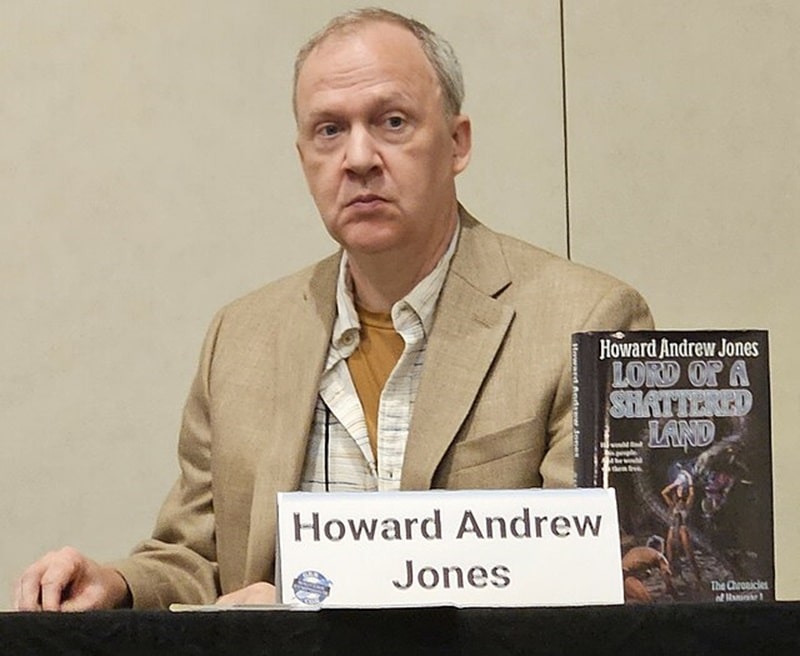 Howard Andrew Jones at GenCon, 2023
Howard Andrew Jones at GenCon, 2023
In 2019, I had an idea: a lot of my friends loved reading sword and sorcery fiction, but they didn’t write it. They would say, “One day.” Many of my undergraduates also expressed interest in writing fantasy, but they often felt discouraged by form rejection letters (genre magazine slush piles are epic). Having studied the history of genre fiction, I knew about the old tradition of “fanzines”— not-for-profit amateur publications that provided a low-stakes outlet for new writers. Just submitting work, collaborating with an editor, and seeing it in print can transform someone’s self-image from being just a reader to being a writer.
So, after some conversations with friends and a bit of encouragement, I started thinking seriously about launching my own zine.
As an academic, I’m deliberate by nature. I like to consult and take my time. Honestly, if I could have formed a committee for this, I probably would have. Instead, I decided to email someone: Howard Andrew Jones.
[Click the images for larger versions.]
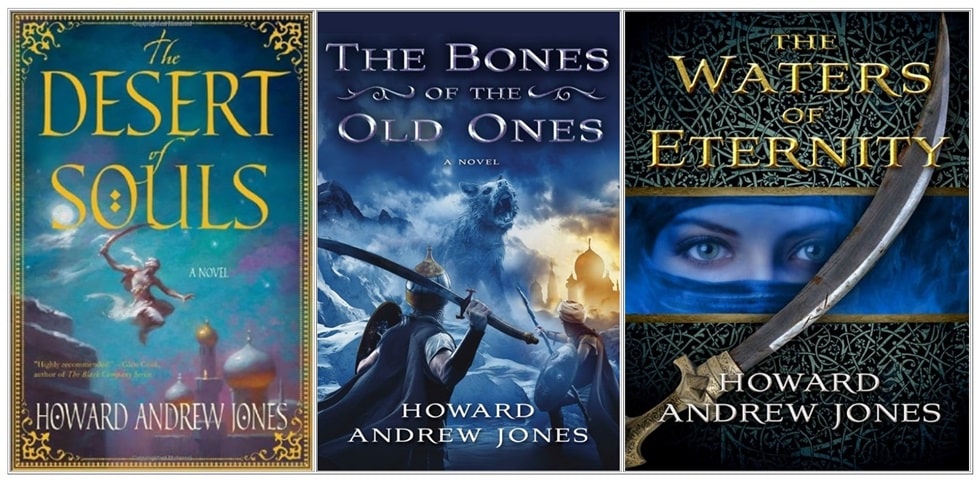 The three Dabir and Asim volumes: The Desert of Souls, The Bones of the Old Ones, and the collection The Waters of Eternity (Thomas Dunne Books, February 2011, December 2012, and November 2011). Covers by Charles Keegan, Steve Stone, uncredited
The three Dabir and Asim volumes: The Desert of Souls, The Bones of the Old Ones, and the collection The Waters of Eternity (Thomas Dunne Books, February 2011, December 2012, and November 2011). Covers by Charles Keegan, Steve Stone, uncredited
At the time, I didn’t know Howard personally, but I knew of him. He was a celebrated name in sword and sorcery. Howard had published an e-zine (Flashing Swords) in the genre, written essays and edited for Black Gate, and authored an incredible series of novels set in a sword-and-sorcery-inspired Arabia featuring Dabir and Asim (The Desert of Souls and The Bones of the Old Ones). He was also working on a new trilogy, The Ring-Sworn Trilogy, and I had already read the first book.
On top of all that, Howard had written several fun Pathfinder RPG novels, and he was editing Tales from the Magician’s Skull, the magazine for contemporary sword and sorcery fiction, published by Goodman Games. I loved that magazine. If anyone could give me advice on starting a zine, it was Howard.
I didn’t expect much when I emailed him. I wrote a long message, gushed a bit as a fanboy, and sent it off. Honestly, I wasn’t really expecting a response.
The next day, I was in my campus office grading papers when my office phone rang. My office phone never rings. In my ten years at CNU, maybe one student has ever called me. It’s practically an artifact – a dusty relic of a bygone era. My first instinct, as a millennial, was to let it go to voicemail. That’s what you do: let them leave a message and call back after some breathing exercises.
But for some reason, I picked it up.
“Hello?”
“Jason?”
“Yeah, this is Jason.”
The voice on the other end was calm, relaxed, with a kind of deliberate enunciation.
“Heeey, Jason! This is Howard.”
“Howard?” I said, not quite connecting the dots.
“Howard Andrew Jones. You emailed me about a magazine idea.”
I still get a little emotional thinking about that first call. Maybe I’m projecting, but I was immediately surprised, disarmed, and touched. Howard had gone out of his way to call me – call me! My office number isn’t even in my email signature, so he must have looked me up online to find my CNU contact info. I hadn’t even expected a reply, and here was this great author, taking the time to phone me.
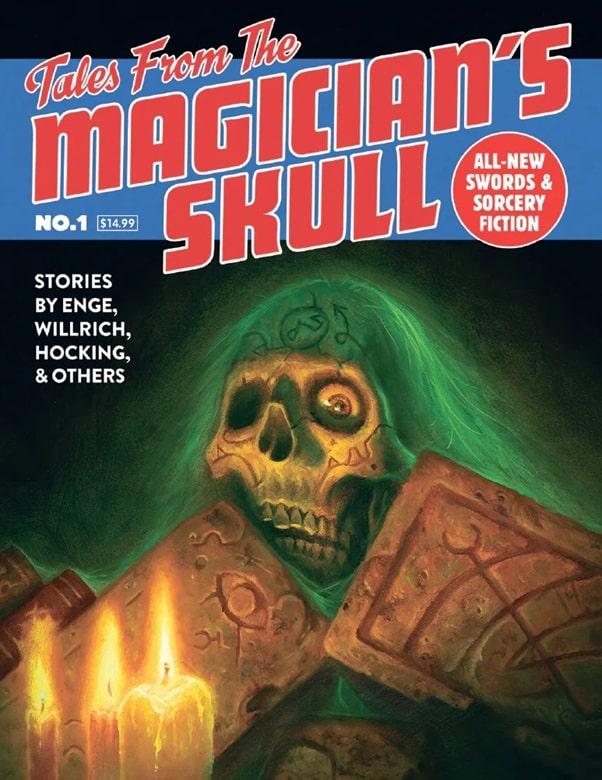
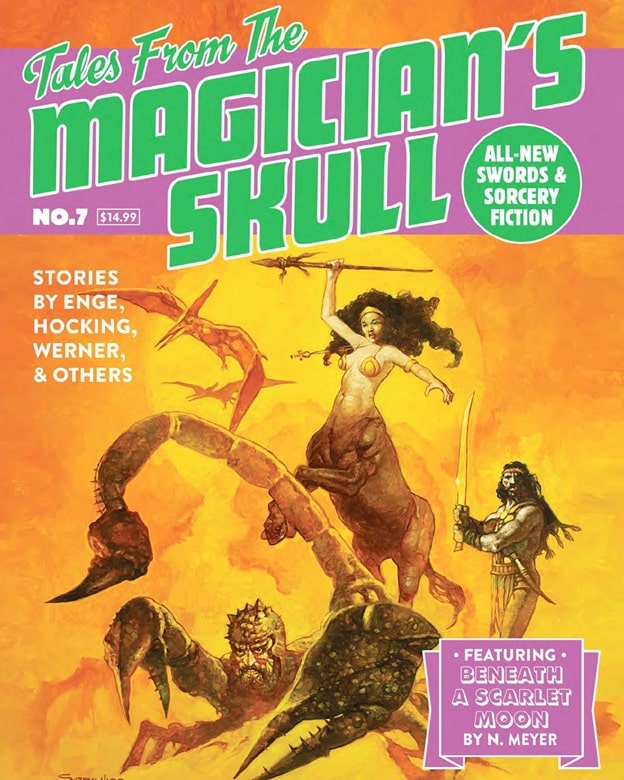
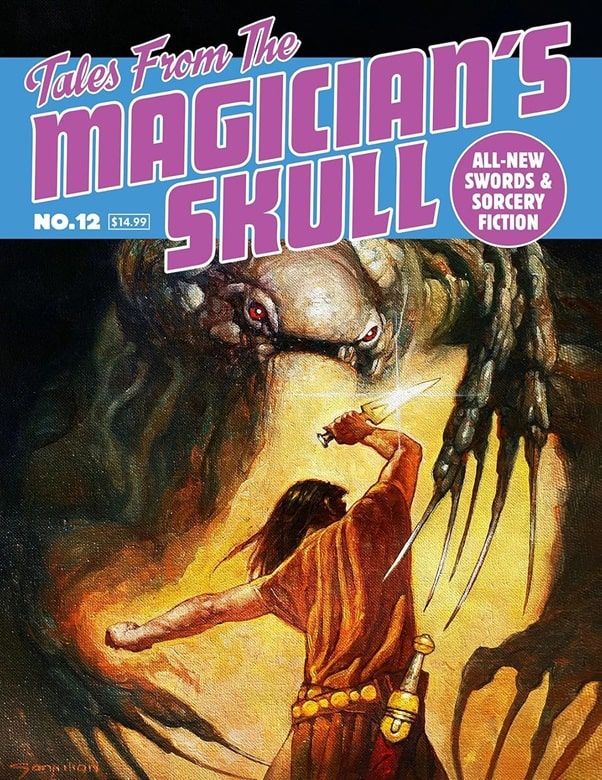
Tales of the Magician’s Skull, edited by Howard Andrew Jones. Issues 1, 7, and 12
(Goodman Games, 2017, 2022, and 2024). Cover art by Jim Pavelec and Sanjulian
I was a bit starstruck when we first talked. I’m already an awkward person, but the awkwardness was dialed up as I tried to gather my bearings. Howard, however, was so kind, calm, and genuinely enthusiastic about fiction, writing, and fantasy literature that I found myself speaking to him like an old friend. I’m pretty sure we talked for over an hour during that first conversation. I remember he was multitasking while on the phone – taking out the trash or doing yard work.
In the years that followed, whenever I spoke to Howard, he always seemed to be en route somewhere – driving to town, running errands, sometimes saying, “Hold on, I’ve got to grab this thing.” He felt real and grounded in a way that made people feel at ease. He gave off this sense of being completely unaware of how cool he was or how others saw him – or, if he did know, he just didn’t put much stock in it.
Over the next five years, Howard and I stayed in almost constant contact. We texted regularly. Often, he’d reply to a message with something like, “You free? Driving to town.” When I started my magazine and created an associated Discord server, he joined and became as active there as anyone, if not more so.
His comments were always supportive, kind, and encouraging. He shared favorite authors, thoughts on prose style, and a steady drip of wisdom for aspiring writers. Whenever anyone mentioned his work, he would chime in, “Thanks for reading it,” “Glad it worked for you,” “Really appreciate the kind words.”
Outside of Discord, we talked on the phone often. One thing I noticed was that Howard frequently mentioned his friends – not in a name-dropping way, like he wanted you to know he knew big authors, but in a way that made you feel like you were part of this collaborative effort, this network of fellow creatives. To him, it seemed, writing wasn’t a solitary pursuit but a shared craft. It was like Howard was always attending a seminar on fiction, and his calls were a way of touching base to see how your progress was going.
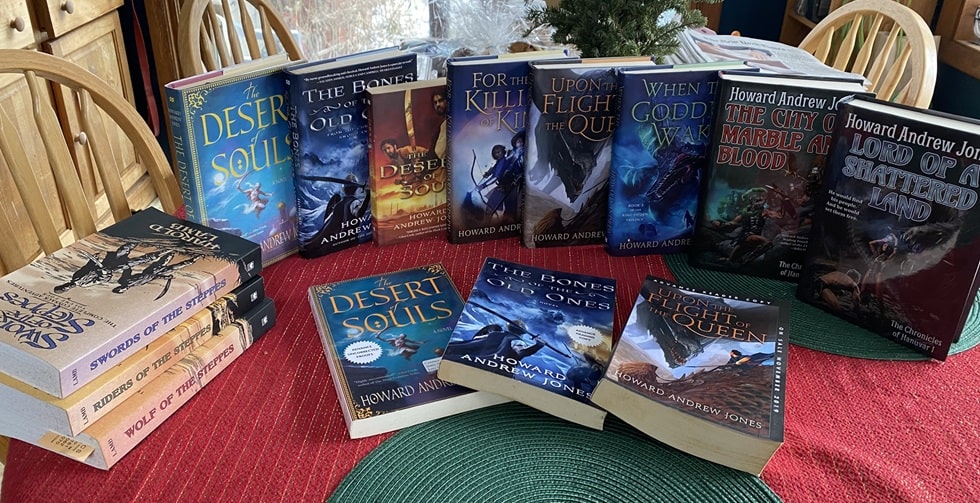 The books of Howard Andrew Jones
The books of Howard Andrew Jones
For instance, he’d say something like, “Hocking and I were talking about dialogue – how it needs to reveal character but economically, like in hardboiled detective fiction” (I’m paraphrasing). From the way he spoke, I got the sense that Howard had a lot of writer friends, and they talked about the craft of writing the way master carpenters might talk about solving technical problems with wood.
Fandom can get a little gossipy, but Howard never said a negative thing about anyone. He was almost stubbornly kind and assumed the best intentions from people. Being in touch with him felt like being welcomed into a very supportive club. Over time – without me even realizing it – Howard became something of a mentor or even a sensei in sword and sorcery writing.
At first, we just talked about sword and sorcery (a genre he was deeply opinionated about – he really didn’t like Tros of Samothrace (“Bounced right off it)), but our discussions evolved into broader topics: writing, work, heroism, and how storytelling affects people’s lives. I can honestly say I learned a lot about writing from him, at least an MFA’s worth, or more.
I met Howard in person three times over the six years I knew him. I saw him at GenCon, the big gaming convention that also includes a section for genre writers. We sat on several panels together discussing sword and sorcery fiction. He attended Howard Days, a celebration of Robert E. Howard, the pulp author who created sword and sorcery (yes, it gets confusing). And then I saw him again at GenCon this past August of 2024.
In August, aside from a persistent leg injury, Howard seemed… OK. I need to be honest and say he struck me as a little blue at GenCon, and he suspected it was due to the injury or the associated medication treating it. He had every reason to be happy. He had just published the first two books of his Hanuvar series. If I remember correctly, book three, Shadow of the Smoking Mountain, had just come out or was coming out. At the convention, he gave me an ARC and signed it with the words, “Find a way or make one.” I took this as a nod to the writer’s life, a reminder to persevere and create despite the challenges.
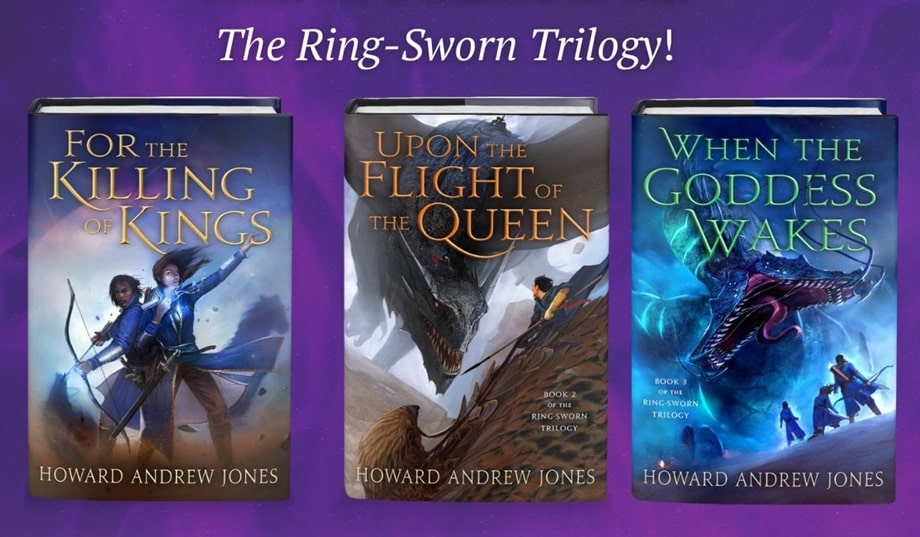 The Ring-Sworn Trilogy by Howard Andrew Jones (St. Martin’s Press, 2018-2021). Covers by Lauren Saint-Onge
The Ring-Sworn Trilogy by Howard Andrew Jones (St. Martin’s Press, 2018-2021). Covers by Lauren Saint-Onge
On the last day of GenCon, literally just before leaving, Howard, my wife Nicole, and I had lunch together. It was the first time Howard had met Nicole. She joked and referred to Howard as “my friend in my pocket” because I was always texting with him. I laughed and told her, “You don’t understand – this guy is so cool. He’s the nicest guy you’ll ever meet.”
That might sound like grief-motivated hyperbole now, but, in hindsight, it wasn’t. That’s exactly how I spoke about Howard before I knew anything was wrong.
Nicole and I had lunch with him, and of course, they hit it off. I can’t recall the details but Howard was fascinated with Nicole’s life growing up on a farm (did Howard come from a rural background?). After the meal, Howard said he was glad to have met her.
We left the restaurant. There were hundreds of people in the corridors at GenCon, a veritable sea of humanity, and Nicole and I were ready to leave, luggage in hand. So, we said our goodbyes. I had no idea it was the final goodbye. Howard gave me a hug and said, “Well, safe travels to you and your beautiful wife. And, keep writing.” Then he disappeared into the crowd.
A few weeks later, I learned he had gone to the hospital with acute symptoms.
I’m still in the anger phase of all this. Howard was such a good guy. It felt like, as a writer, he was hitting his peak. In my view, he had so much more to give the world – not just through his novels but through who he was as a person. I know my story is just one of many similar ones. That’s the kind of person Howard was: everyone who met him seemed to come away with a story about his kindness. This tragedy couldn’t have happened to a more undeserving person.
Howard, you’ll be missed, man. Thanks for being you.
Jason Ray Carney is a Lecturer in Popular Literature at Christopher Newport University. He is the author of the academic book, Weird Tales of Modernity (McFarland), and the fantasy anthology, Rakefire and Other Stories (Pulp Hero Press). He edited Savage Scrolls: Thrilling Tales of Sword and Sorcery for Pulp Hero Press and is an editor at The Dark Man: Journal of Robert E. Howard and Pulp Studies and Whetstone: Amateur Magazine of Sword and Sorcery. His last article for Black Gate was a review of Lord of a Shattered Land.
A Tide of Black Steel – Now Available

A Tide of Black Steel – Book One of The Age of Wrath trilogy- is published today in the US, UK, Canada, Ireland, Australia, New Zealand, and South Africa. Thanks to everyone at Orbit for making it happen.
The winners of the signed books and bookplates giveaway have now been chosen and notified – check you spam folders to make sure you haven’t missed out on a prize. Many thanks to everyone who entered and for all the kind comments – sorry I couldn’t reply to everyone individually.
Reviews:
‘These wonderful characters and story arc complexity matched with Ryan’s ability to build you up to–and deliver–epic moments (including an ending twist that is just chef’s kiss), wonderfully showcases the author’s skills as a fantasy storyteller.’ – Grimdark Magazine.
‘Rich world building, well-developed characters, and shocking betrayals are precisely what readers expect from Anthony Ryan as he kicks off the Age of Wrath trilogy.’ – Booklist.
‘A gripping epic… Ryan distinguishes himself with deep dives into his characters’ psyches and motivations. This is an exciting start.’ – Publishers Weekly
‘A grim, gritty, glorious Norse epic that begs to be devoured by fans of John Gwynne and Michael Hirst’s ‘Vikings’. You will come away with a taste of the salt sea and the smell of blood in the air, and characters you can’t wait to read more about. Grimdark at its finest.’ – FanFiAddict
Book description:
A NEW AGE HAS DAWNED. AN AGE OF BLOOD AND STEEL.
AN AGE OF WRATH.
The land of Ascarlia, a fabled realm of bloodied steel and epic sagas, has been ruled by the Sister Queens for centuries. No one has dared question their rule.
Until now.
Whispers speak of longships of mysterious tattooed warriors, sailing under the banners of a murderous cult of oath-breakers long thought extinct. A tide of black steel that threatens to vanquish all in its path.
Thera of the Blackspear, favoured servant of the Sister Queens, is ordered to uncover the truth. As Thera sails north, her reviled brother, Felnir, sets out on his own adventure. He hopes to find the Vault of the Altvar – the treasure room of the gods – and win the Sister Queens’ favour at his sister’s expense.
Both siblings – along with a brilliant young scribe and a prisoner with a terrifying, primal power – will play a part in the coming storm.
The Age of Wrath has begun.
A Tide of Black Steel begins a new blockbuster epic fantasy series from international bestseller Anthony Ryan, whose books have sold more than a million copies worldwide.
Buy here:
Ebook: Amazon.com – Amazon.co.uk – Nook – Kobo – Google Play
UK Hardcover: Amazon.co.uk – Waterstones – Blackwells
Special Edition Signed Hardcover: Goldsboro Books. – The Broken Binding
US Paperback: Amazon.com – Barnes and Noble
Audiobook: Audible.com – Audible.co.uk – Barnes and Noble – Google Play
Did a little bit of signing yesterday at The Broken Binding. If you’ve ordered from them, I’m told the books should ship this week. I’m off to Goldsboro Books next week to sign their stock.

Some people have been asking when or if this book will be published in their language / country. So far, the series has been sold to publishers in France, Germany, Czechia, and Poland. I don’t yet know the publication date for each country but will update as and when I’m told.
Announcing the sequel to HELL FOR HIRE...
HELL OF A WITCH
coming out Oct 1, 2024!
 The hotly anticipated sequel to HELL FOR HIRE...
The hotly anticipated sequel to HELL FOR HIRE...One month ago, Bex, the demon queen, and Adrian, witch of the Blackwood, pulled off the upset victory of the century. Now, they find themselves facing the question all unexpected champions must answer: what next? They declared war on Heaven, but how do you actually bring down a divinely powerful tyrant when your army’s still in the single digits and your magical fortress is an illegally modified Winnebago?
It seems like a hopeless situation. As always, though, Adrian Blackwood has a plan, and this time, he’s going big. He’s got an idea to take down the Seattle Anchor, the giant magical fortress that houses the Anchor Market and every other bit of critical infrastructure that connects Heaven to Earth.
How the Anchors work is a closely guarded secret, and getting to the good stuff will require going deep into the heart of Gilgamesh’s power. There’s a reason even the Queen of Wrath has never attacked one directly, but now that Adrian’s on her team, Bex thinks they can do it. She’s finally got the power she needs to actually move the needle on this war, and she’s going to hit that Anchor with all the fire she’s got.
But the enemies of Heaven aren’t the only ones making plans. After the fiery return of his most persistent annoyance, Gilgamesh has ordered his princes to take care of the demon queen problem personally. It’s time to roll out the big guns and show these rebels what divine wrath really means, starting with the Hell of a Witch who made it all possible.
Coming out October 1 in ebook, Kindle Unlimited, paperback, hardback, and an absolutely incredible audio edition!Preorder Now!Boston, what are you doing? Get out from in front of the title!
*Attempts to push familiar away with broom. Broom and cat team up. The author is forced to retreat.*
Ahem... It's sequel time! Y'all made HELL FOR HIRE one of my best new launches ever, and now the second book is almost here. HELL OF A WITCH has more of everything you love, and it's coming out all formats on October 1! Hooray!
Thank you all so much for making this series such a success. I'm so grateful you're enjoying the story, because I love these misfits to death. So much that I've already written book 3, which will be coming out in early 2025! So many books! It's the best of times.
I really hope you'll give HELL OF A WITCH a try, and if you haven't cracked into my Tear Down Heaven series yet, what are you waiting for? It's awesome! The audio book in particular is *chef's kiss*. One of the best things we've ever done. Highly recommended.
Again, thank you all so so much for being my readers and listeners. I hope you love this book as much as I do. It's just so much fun and I can't wait for you to get into it. This series is going to be a truly epic ride.
Thanks again for making my dreams come true! Yours always and forever,
Rachel AaronWitch Career Counselor Assistant to the Familiars
HELL OF A WITCH is the second book in the Tear Down Heaven series. If you're new, start from the beginning with HELL FOR HIRE. I promise you won't be sorry!
'The Five: The Untold Lives of the Women Killed by Jack the Ripper' by Hallie Rubenhold
Polly, Annie, Elizabeth, Catherine and Mary-Jane are famous for the same thing, though they never met.
They came from Fleet Street, Knightsbridge, Wolverhampton, Sweden and Wales. They wrote ballads, ran coffee houses, lived on country estates, they breathed ink-dust from printing presses and escaped people-traffickers.
What they had in common was the year of their murders: 1888.
Their murderer was never identified, but the name created for him by the press has become far more famous than any of these five women.
Now, in this devastating narrative of five lives, historian Hallie Rubenhold finally sets the record straight, and gives these women back their stories.
⦾
The Five: The Untold Lives of the Women Killed by Jack the Ripper by Hallie Rubenhold, read on audiobook by Louise Brealey.
“Poor women were expendable …”
I listened to the audiobook of this, via my library's BorrowBox app - even though I've also owned the B-format paperback since about 2020, I could just never bring myself (or my heart) to pick it up and read it of my own volition, but on audiobook I tore through it. And under the talent of Brealey's narration, who could bring out various regional accents to really help things along - it was superb.
This was such a tough listen but I’m really really glad that I finished this book and I found it to be an extraordinary non-fiction work and by far one of the best non-fiction books I’ve read in a long time.
I was completely upended, however to discover that this book has pissed off so many people and specifically “Ripperologists” to the point that Hallie Rubenhold has been horribly abused and harassed because she did to research into the canonical five victims of Jack the Ripper - and put fourth credible evidence that not all of them were prostitutes as the sick lore of this madman murdering spree dictated for so long.
Her book is a gracious and human examination of what it meant to be a woman in the 1880s and the impossible position that they were put in to either be Madonna or whore. She digs into the Victorian mindset of the time that insisted that their murders had to somehow be prescriptive to the wider public and so they were painted as Scarlet women. Their stories absolutely broke my heart and patterns did emerge in all of them — domestic violence, alcoholism (if only to have some alleviation from the drudgery of being a woman at the time) … the way people were kept impoverished and women in particular who had to bear the burden of childbirth and child rearing. Lack of education being the lightning rod overarching issue for so many people of this time. Just an incredible historical examination of everything never said about these women that I found to be so touching and crucial.
As I was reading, I was repeatedly struck by the realisation of how true it is now - just as it was in 1888 - that all it takes is a bad bout of luck, illness or injury for any one of us to experience houselessness and our fate to be completely undone. I thought that about each of these women at so many points in their life as Hallie unpicked them for us ... and my god, did my heart go out to them - across space and time.
The very final chapter in the book is the Author listing all of the items found on four of the victims upon their death; in one of their pockets was one red mitten — and that visual is just touching and heartbreaking, as was the entire book.
5/5
Tempus fuck it!
In a few short days, Prince of Thorns becomes a teenager and will be the same age as Jorg himself for the first few pages of the novel!
I never expected to be an author. I certainly never expected this guy to pay off my mortgage. And I absolutely didn't expect to still be signing copies of the book in my local Waterstones 13 years after it was published.

The shelf life of an author is typically one book. Fantasy authors more often get a trilogy, because that's how fantasy rolls. But yup, not many of us hang around for long, and the past 13 years are littered with the bright flashes of many fine writers who came along about the same time as me.
I've said - so often that I'm bored of hearing myself say it - that all forms of writing success require large doses of luck. Skill at writing and at story telling are what buys you the lottery ticket. After that you need the stars to align.
It's easy to focus on the hyper-rare examples where the celestial alignment has been of atonishing proportions, and to feel a measure of discontent. But I'm constantly aware that so many fine writers have failed to flourish where I've been fortunate enough to make a living for over a decade now.
So, in part this post is a big thankyou to all you readers who've made that possible.

It's scary to look back at my bibliography and think that (with the exception of the Impossible Times books) each of those novels represents a year of my life. I have grown significantly older doing this...
People often talk to me about pride and about legacy, as if these stories are somehow more of an achievement than the myriad things everyone else has spent the last 13+ years on. I don't subscribe to that point of view, at all. Almost every book is a line drawn in wet sand and if the wave that will wash them away hasn't arrived in 13 years, then it's certainly going to hit the beach at some point, and sooner than most folk think.
I'm pleased and grateful that I've been able to share these stories, but 'proud' isn't a word I'd use. It's ... complicated.
Anyway, enough navel gazing. Just as I had no idea what the 13 years after Prince of Thorns hitting the shelves would look like, I have no idea where we'll be when the book reaches 18 or 21. Will anyone remember Jorg on the 25th anniversary in 2036 ... who knows.
For now though, the ideas keep coming and the itch to write continues to require scratching. I've finished three books this year, and hopefully will have a 4th done by Christmas.
Thanks for reading!

Join my Patreon.Join my 3-emails-a-year newsletter. #Prizes #FreeContent
'The Ministry of Time' by Kaliane Bradley

From the BLURB:
A BOY MEETS A GIRL. THE PAST MEETS THE FUTURE. A FINGER MEETS A TRIGGER. THE BEGINNING MEETS THE END. ENGLAND IS FOREVER. ENGLAND MUST FALL.
In the near future, a disaffected civil servant is offered a lucrative job in a mysterious new government ministry gathering 'expats' from across history to test the limits of time-travel.
Her role is to work as a 'bridge': living with, assisting and monitoring the expat known as '1847' - Commander Graham Gore. As far as history is concerned, Commander Gore died on Sir John Franklin's doomed expedition to the Arctic, so he's a little disoriented to find himself alive and surrounded by outlandish concepts such as 'washing machine', 'Spotify' and 'the collapse of the British Empire'. With an appetite for discovery and a seven-a-day cigarette habit, he soon adjusts; and during a long, sultry summer he and his bridge move from awkwardness to genuine friendship, to something more.
But as the true shape of the project that brought them together begins to emerge, Gore and the bridge are forced to confront their past choices and imagined futures. Can love triumph over the structures and histories that have shaped them? And how do you defy history when history is living in your house?
'The Ministry of Time' is the debut novel from British-Cambodian writer and editor based in London, Kaliane Bradley.
So, this may well be my favourite book of 2024. WOW-ee. What an enjoyable read, especially for a low-science fiction girly whose particular proclivity is time-travel tales (those are always my fave 'Doctor Who' episodes, the back-in-time ones). So, some random observations;
⦿ I am very fond of 2005 YA novel 'The White Darkness' by Geraldine McCaughrean, which is about a teenage girl who is genuinely in love with (the long-dead) Captain Lawrence 'Titus' Oates from the doomed Terra Nova Expedition. So when I read the blurb for 'The Ministry of Time' about Britain having harnessed time-travel and successfully bought six travellers from various eras to the modern-day, including Commander Graham Gore from the doomed Franklin expedition - I was all in. *Especially* when the blurb hinted that Gore's present-day "bridge" - the protagonist of the novel who is tasked with helping him acclimatise and who maybe starts to develop feelings - I was *ALL IN*.

⦿ Time-travel has always been my bag. Modern-day women falling for out-of-time men is my particular favourite sub-genre ... I know exactly when this started; 'Playing Beatie Bow' by Ruth Park, and the time-travelling Abigail falling for Judah in the 1800's. This was particularly cemented when I read 'Outlander' by Diana Gabaldon as an 18-year-old; WWII army-nurse Claire passing through the stones to Jamie Fraser in the 18th century. No doubt there's some Marty McFly 'Back to the Future' Michael J. Fox appreciation thrown in there too. But this sub-genre of sci-fi and time-travel is my jamboree. And 'The Ministry of Time' gave it to me in HEAPINGS of timey-wimey goodness. The romance is slow-burn but makes up for it because our protagonist (whose name we don't know, but we get an intimate first-person account from) crushes HARD on Gore and that amps up the burn. But I was also very sucked into the mechanics and politics of the time-travel itself, so it wasn't like I was ever cooling my heels and checking my watch for the low sci-fi to get good ... it was ALL good.
⦿ The politics of time-travel in this book reminded me of the Norwegian sci-fi series 'Beforeigners', about people from different time-periods suddenly randomly appearing in Oslo, becoming refugees of time that the Norwegian government has to deal with. It's also a little bit like the (brilliant) Aussie TV series 'Glitch' set in a small outback town where; 'Seven people from different time-periods return from the dead with no memory and attempt to unveil what brought them to the grave in the first place.' I like this connection in particular because there's a shady organisation linked to the raising of the dead, a big-pharma laboratory called "Noregard" (best in-universe name for a corporation, ever.) It's also a wee bit like the 2001 rom-com starring Hugh Jackman and Meg Ryan, 'Kate & Leopold' about an English Duke from 1876 falling for a modern-day New Yorker when he's unceremoniously dragged into the future. If any/all of those recs are your picnic; this book is for you.

⦿ He filled the room like a horizon ... the writing was sumptuous, and gorgeous at times. Sometimes Bradley had a turn-of-phrase of description that made me go "ohhhhh." When something changes you constitutionally, you say: ‘the earth moved,’ but the earth stays the same. It’s your relationship with the ground that shifts.
⦿ I actually first heard about this book, in a Guardian round-up of British debuts to look out for, and the description of Kaliane Bradley's idea made my spine sizzle and then I Googled her even more and found that she partly wrote the idea for 'The Ministry of Time' during Covid and lockdowns and because she kinda fell in love with the only photograph of Graham Gore. No, really. 'Kaliane Bradley Fell in Love With a Dead Man. The Result Is The Ministry of Time' ... if that's not an *amazing* sales-pitch I don't know what is.

⦿ I just loved this. It's extremely cinematic and I wouldn't be surprised to find it is being developed into a movie or limited-TV series. It both feels appropriately head-nodding to plenty of other fabulous low-sci-fi time-travel that will make aficionados happy, but also sparkly-unique enough to keep adding to the conversation about the space-time continuum. Even if I guessed the small twist that comes, I did so because I know this sub-genre so well and expected certain markers along the way and Bradley did not disappoint. I loved this so much, I was only one-chapter in when I knew it'd give me the best bookish hangover and be hard book to follow-up, probably throwing me into a reading-rut.
5/5
Special Edition News!

The new covers and internal art are all by the original cover artist, Jason Chan.
Pre-order your copy here: https://grimoakpress.com/products/prince-of-fools
Here's a piece of the artwork - check the link for more!

Join my 3-emails-a-year newsletter. #Prizes #FreeContent
NURSERY CRIMES is Out Now!
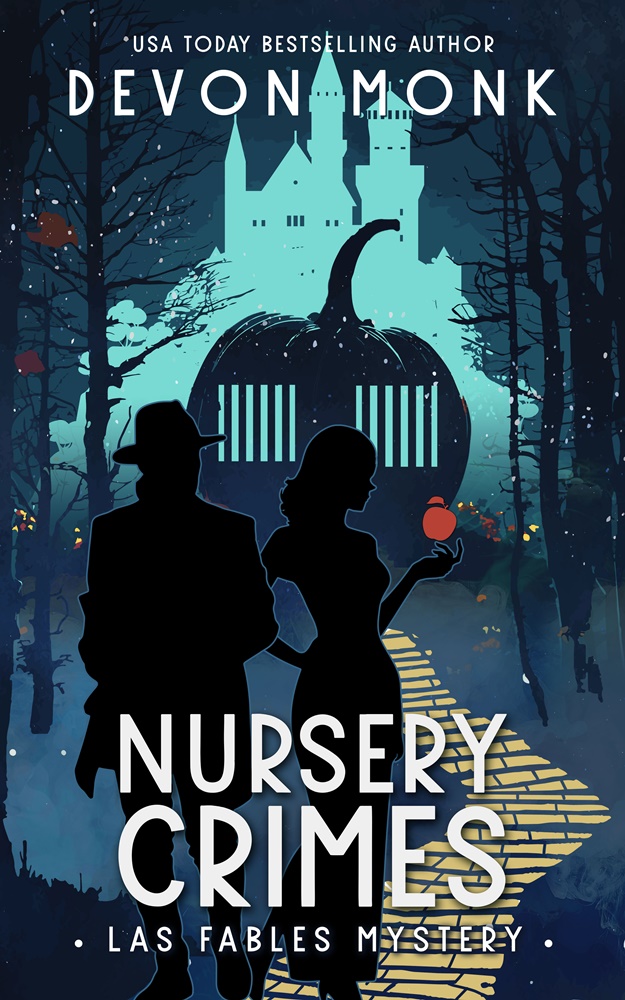
This is the city of Las Fables. I work here. I’m Detective Peter Peter. I put ‘em in the pumpkin shell.
Las Fables is a land of fairy tales and rhymes. Sure, it used to be made of sugar and spice, but Mother Goose flew the coop and hasn’t been seen in years. Darkness has settled over the town, whiffling and galumphing down the yellow brick lanes.
When the Seven Dwarves are gunned down in the Old Woman’s Shoe Bar, Detective Peter Peter and his partner Jack Horner are on the case. No matter how over the hill and far away the clues take them, they’ll see that justice is served–not too hot, not too cold, but just right.
Of course it isn’t just crime on Peter Peter’s mind. There’s a dame named Muffet who’s got him in a tizzy. And it’s gonna take all of his willpower to keep his heart from tumbling down after her.
Amazon Apple Barnes and Noble KoboYes! Nursery Crimes is a short, fun standalone book set in the storybook land of Las Fables. I am so excited to finally get to share it with you! Just like the description says, it’s a smashup: hard-boiled mystery, fairy tales, nursery rhymes, and lots and lots of ridiculous jokes.
I hope you enjoy! (print will be available soon!)
HELL FOR HIRE is out today!
 "Featuring a motley crew of loveable demons, a chaotic male forest witch with a sassy talking cat familiar, snarky sentient weapons, wicked warlocks, and plenty of magical mayhem, Hell for Hire is a bewitching and diabolically fun urban fantasy that is as thrilling as it is wholesome." - Before We Go Book Blog
"Featuring a motley crew of loveable demons, a chaotic male forest witch with a sassy talking cat familiar, snarky sentient weapons, wicked warlocks, and plenty of magical mayhem, Hell for Hire is a bewitching and diabolically fun urban fantasy that is as thrilling as it is wholesome." - Before We Go Book Blog"Rachel Aaron has never ever failed to deliver an effortlessly engaging story filled with lovable characters, and an amazing, yet accessible, worldbuilding that is uniquely hers. It came as no surprise that Hell For Hire has all her usual winning trademarks and is possibly her best first book in a series so far." - Novel Notions
"Hell for Hire is an urban fantasy tale that follows a ragtag group of demons and the outcast witch they're hired to protect. Boasting loveable characters, unique lore, and a whole lot of heart, this urban fantasy romp is an absolute delight." - Simple Reads
"Hell For Hire is an absolute blast to read as it combines action, comedy, and lots of magic for a unique story. Rachel Aaron with her eighth (or ninth) series opener showcases exactly why she has no peers in the urban fantasy genre. If you want to have lots of fun, thrills and action, look no further. Hell For Hire is available to fulfill all your needs and more." - Fantasy Book Critic
"Aaron has done it again, giving us a whole new world in which to enjoy her outstanding craft. While many of the themes will be familiar, Aaron has created something fun and wonderful that delighted me. I blazed through this book, sacrificing sleep and productivity. Loved the world building and as usual with Aaron, loved her characters and the obstacles they face, overcome, and the new crises that arise from the ashes to challenge the protagonists anew. Can’t wait for the next book! This is already a must-read." - J Graham (audiobook review)Get your copy now in ebook, print, audio, or KU!The time has finally come! I finally get to share the book that's consumed my last year with you, and I can't wait for you to read/listen to HELL FOR HIRE, which is available right now in ebook, print, audio, and Kindle Unlimited!
I know it's not the DFZ and there aren't any dragons (yet), but I still hope you'll give it a try, because this book was an absolute blast to write! I've never had so many great critic reviews right off the bat. And if you're worried about starting a new book 1, I've got you, because book 2 is already written and going through proofreads, which means it will be available later this year. This series, she is rolling!
And speaking of rolling, you should give the audio edition a try on this one, because our new narrator, Nicholas Cain, narrated the hell out of it, pun entirely intended. ;) The audiobook is also available in stores other than Audible this time! Here's a list of all places you can find it, I hope you'll give the story a listen :D
If print is more your thing, we have hardbacks, and they are sexy! I mean, just look at this.


Ah, the sight fills my book-hording heart with joy <3
I think that's enough promo for one morning. Thank you all so, so much for coming along with me on this crazy journey! I couldn't do any of this without your support, and I hope from the bottom of my heart that you love HELL FOR HIRE as much as I do. Thanks again, and I'll see you for the next book!
Yours sincerely,
Rachel AaronProfessional Familiar Consultant, talk to me about talking cats!
HELL FOR HIRE is the first book in the new Tear Down Heaven series, which will be five books in total. The second book will be out in Fall of 2024. I hope to see you then!
'Love, Death & Other Scenes' by Nova Weetman

From the BLURB:
Nova Weetman’s unforgettable memoir reflects on experiences of love and loss from throughout her life, including: losing her beloved partner, playwright Aidan Fennessy, during the 2020 Covid lockdown; the death of her mother ten years earlier; her daughter turning eighteen and finishing school; and her own physical ageing. Using these events as a lens, Nova considers how various kinds of losses – and the complicated love they represent – change us and can become the catalysts for letting go.
This is a moving, honest account of farewelling a partner of twenty-five years, parenting teenagers through grief, buying property for the first time at the age of fifty, watching Aidan live on through his plays, and learning to appreciate spending hours alone with only the household cat for company. Warm and wise – and often joyful – Love, Death & Other Scenes ultimately focuses on the living we do after losses and what we learn from them.
At one point while reading Nova Weetman's memoir, I said out loud to the empty room; "Geez, you're good Nova."
Such was the power and force of certain sentences, ideas, inflections and offerings throughout. "As writers, we are stealers of other peoples memories, bowerbirds of story," she writes at one point - and then puts that ability to collect on full display throughout as she recounts the life she built with her partner, playwright Aidan Fennessy, who battled and then died from prostate cancer in 2020 during Melbourne's numerous lockdowns and waves of Covid.
I know Nova as a colleague, a fellow middle-grade author and someone I greatly admire, and whose books I truly - hand on heart - believe helped me in tapping into my own voice for this age group. I think it's a little odd that I feel like I know-her, *know* her now after reading 'Love, Death & Other Scenes,' though. And especially because I have a tangential understanding of the loss she and her two children experienced in 2020. My uncle died after his third bout of cancer - having beat the other two, it was pancreatic in the end, third time unlucky - and unlike Nova's partner who had the option but didn't use it; my uncle chose Voluntary Assisted Dying and went out on his own terms, at home, December 2020. We were all there. I'm both surprised and not at all by how much reading Nova's perspective of a death like that during Covid - which I watched my aunt and cousin go through, one of the helpers minding children and looking for ways to ease their pain - I needed to reexamine and feel.
But I'm also surprised at how beautifully romantic this book was too, as Nova writes about how she and Aidan first met - how she fell first, and pursued ... how so much of their relationship felt like it needed balancing, especially in their creative exchange; ‘He introduced me to albums I’d never heard, to singers dead before my time, and the way that songs stain your memories giving them meaning they don’t have in silence.'
In this too, I feel weirdly intimate to the story because Nova writes about Aidan's final play he ever wrote - 'The Heartbreak Choir' - finally being staged, but only after his death. His final work he never got to see fully-realised. It's because I know Nova and am a fan of hers, that I was aware through social media what she was going through - and when tickets became available for 'The Heartbreak Choir' debut performance in Melbourne, I snapped them up for both myself, my mum, and my aunt - also knowing that she in particular may find some comfort in both the story, and its background. And she did - we all did. I saw 'The Heartbreak Choir' in May 2022 and loved it! A play my Aunt still talks about, has triggered her love of theatre to the point that she and my mum will now spontaneously ask me to check out what's on and what's coming up, book something for us all.
'Love, Death & Other Scenes' feels like another chapter to that play, in a way. How apt, that Nova muses towards the end of her memoir; ‘And it is in words that I can find him,' and it's in both her words and his that I feel something being unlocked, and another story I want to share with my family. That I want to press this book into their hands and say; 'It's us, a little bit.' We're not so alone, I think.
5/5
New series!!
Introducing...HELL FOR HIRE coming out June 4!
 The Crew
The CrewA hulked-out wrath demon who eats gamer rage and loves cats, a shapeshifting lust demon who enjoys their food a bit too much, and a void demon who doesn’t see the point of any of this. They’re not the sort of mercenaries you hire on purpose, but Bex wouldn’t trust her life to anyone else.
Ever since the ancient Mesopotamian king Gilgamesh decided death wasn’t for him, killed the gods, and conquered the afterlife, times have been rough for a free demon. But the denizens of the Nine Hells aren’t the quitting sort, and Bex and her team have been choking a living out of the Eternal King’s lackeys for years. It’s not honest work, but when Heaven itself declares you a non-person, you smash-and-grab what you can get.
This next gig looks like more of the same…until Bex meets the client.
The Job
Adrian Blackwood is a witch with a problem. His family has skirted the edges of King Gilgamesh’s ire for centuries, but thanks to a decision he made as a child, Adrian is personally responsible for putting his entire coven in Heaven’s crosshairs.
Determined to set things right, Adrian drags his broom, caldron, and talking cat thousands of miles across the country to Seattle where he can fight the Eternal King’s warlocks without bringing the rest of his family into the fray. But witchcraft--like all crafts--takes time, and if the warlocks catch him before his spells are ready, he’s dead. So Adrian does what any professional witch would do and hires a team of mercenaries to keep the warlocks off his back. He didn’t expect to get demons, but when you’re already on the killing-edge of Heaven’s bad side, what’s a bit more fuel on the fire?
Sometimes you get more than you paid for.
Neither Adrian nor Bex knew what to expect when they signed their contract, but witch-plus-demon turns out to be a match made in the Hells. With this much chaos at their fingertips, even impossible dreams start to come back into reach, because Bex wasn’t always a mercenary. She used to be the Eternal King of Heaven’s biggest nightmare, and now that she’s got a witch in her corner, it’s time to put the old magics back on the field and show Adrian Blackwood just how much Hell he’s hired.
Preorder Now!Big day in book-land!
First up, BY A SILVER THREAD is on sale this week for $0.99, so if you haven't given my new DFZ Changeling series a try, now's a great time to pick it up for cheap!
Second (and way more excitingly), I've got a brand-new book for you to dive into! Introducing HELL FOR HIRE, the first in the Tear Down Heaven series and a return to the classic Rachel-Aaron-style of big ensemble casts full of funny characters, crazy magic, world-ending stakes, and epic swordfights. If you liked my Eli Monpress fantasy books or the original Heartstrikers series, this is going to be right up your alley. There's a new magical system, demons with weird immortality issues, witch-family drama, and terrifying heavenly princes who will murder you while looking gorgeous. It's just a ton of fun and I can't wait for you to read it!!
HELL FOR HIRE comes out June 4, 2024 in all formats, including ebook, print, KU, and audio. If any of that changes, I'll be sure to let you know. Thanks for being my readers/listeners! I couldn't do any of this without you.
Yours always,
Rachel AaronDivine Orchestrator Professional Demon Herder
Want to see all of my books in order, read samples, and know which series are finished? Visit www.rachelaaron.net!
'Unruly: A History of England's Kings and Queens' audiobook read by author, David Mitchell

From the BLURB:
A seriously FUNNY, seriously CLEVER history of our early kings and queens by one of our favourite comedians and cultural commentators.
This will be the most refreshing, entertaining history of England you'll have ever read.
Certainly, the funniest.
Because David Mitchell will explain how it is not all names, dates or ungraspable historical headwinds, but instead show how it's really just a bunch of random stuff that happened with a few lucky bastards ending up on top. Some of these bastards were quite strange, but they were in charge, so we quite literally lived, and often still live, by their rules.
It's a great story. And it's our story. If you want to know who we are in modern Britain, you need to read this book.
♛ ♛ ♛
This just *delighted* me and had me running to find any other audiobooks of David Mitchell's on my Library's BorrowBox app (and yes, I am forever disappointed when somebody says "David Mitchell" and means the bloke who wrote Cloud Atlas. I want 'Peep Show' David Mitchell, 'Upstart Crow' David Mitchell - and this book proves why!)
I listened to this while I walked the dog, and I must have looked like a King George III-level maniac laughing and guffawing as I picked up his poo (with a bag) and walked blithely along, nodding and laugh/crying ... but it was truly just *that* good!
David Mitchell's injections and rants are next-level (at one point he manages to tie in the absurdity of awards for art; like the year that the theme song for 'Shaft' was up against 'The Age of Not Believing' from 'Bedknobs and Broomsticks' for best song at the Oscars, to which he says you may as well compare a fish-finger to a ladder for all the good it does to categorise and quantify two pieces of art like that ... and he's not wrong!)
Mitchell only takes the book up to King James-ish because he says that was the last time that monarchy had true, absolute power before Parliament, Prime Ministers, foreign Governments and such started interfering with what the royals had bamboozled England into thinking was "divine rule," ... I do hope he decides to write a second-book about the waning royals (is it too much to ask that he give a full-throated debate on why a Republic would be better? Throughout the listening of this I could feel his tension to rein in what could have been an 11-hour long rant on the subject!)
As such, this was perhaps the most enjoyable new read I've encountered this year so far. Amazing!
5/5



Recent comments